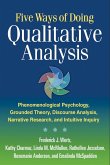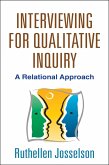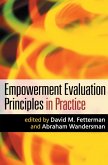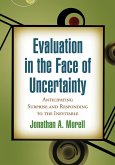This unique text provides a comprehensive framework for creating, managing, and interpreting qualitative research studies that yield valid and useful information. Examples of studies from a wide range of disciplines illustrate the strengths, limitations, and applications of the primary qualitative methods: in-depth interviews, focus group discussions, ethnography, content analysis, and case study and narrative research. Following a consistent format, chapters show students and researchers how to implement each method within a paradigm-neutral and flexible Total Quality Framework (TQF) comprising four interrelated components: Credibility, Analyzability, Transparency, and Usefulness. Unlike other texts that relegate quality issues to one or two chapters, detailed discussions of such crucial topics as construct validity, interresearcher reliability, researcher bias, and verification strategies are featured throughout. The book also addresses applications of the TQF to the writing, review, and evaluation of qualitative research proposals and manuscripts.
Pedagogical Features
*Summary tables that highlight important content, such as the application of a method to vulnerable or hard-to-reach populations.
*Case studies that illustrate TQF standards in practice for each method.
*Guidelines for effective documentation (via thick descriptions) of each type of study.
*End-of-chapter discussion topics, exercises, and suggested further reading and Web resources.
*Chapters open with a preview and close with a bulleted summary of key ideas.
*Extensive glossary.
2021 Winner--American Association for Public Opinion Research (AAPOR) Book Award
Pedagogical Features
*Summary tables that highlight important content, such as the application of a method to vulnerable or hard-to-reach populations.
*Case studies that illustrate TQF standards in practice for each method.
*Guidelines for effective documentation (via thick descriptions) of each type of study.
*End-of-chapter discussion topics, exercises, and suggested further reading and Web resources.
*Chapters open with a preview and close with a bulleted summary of key ideas.
*Extensive glossary.
2021 Winner--American Association for Public Opinion Research (AAPOR) Book Award
Dieser Download kann aus rechtlichen Gründen nur mit Rechnungsadresse in A, D ausgeliefert werden.









